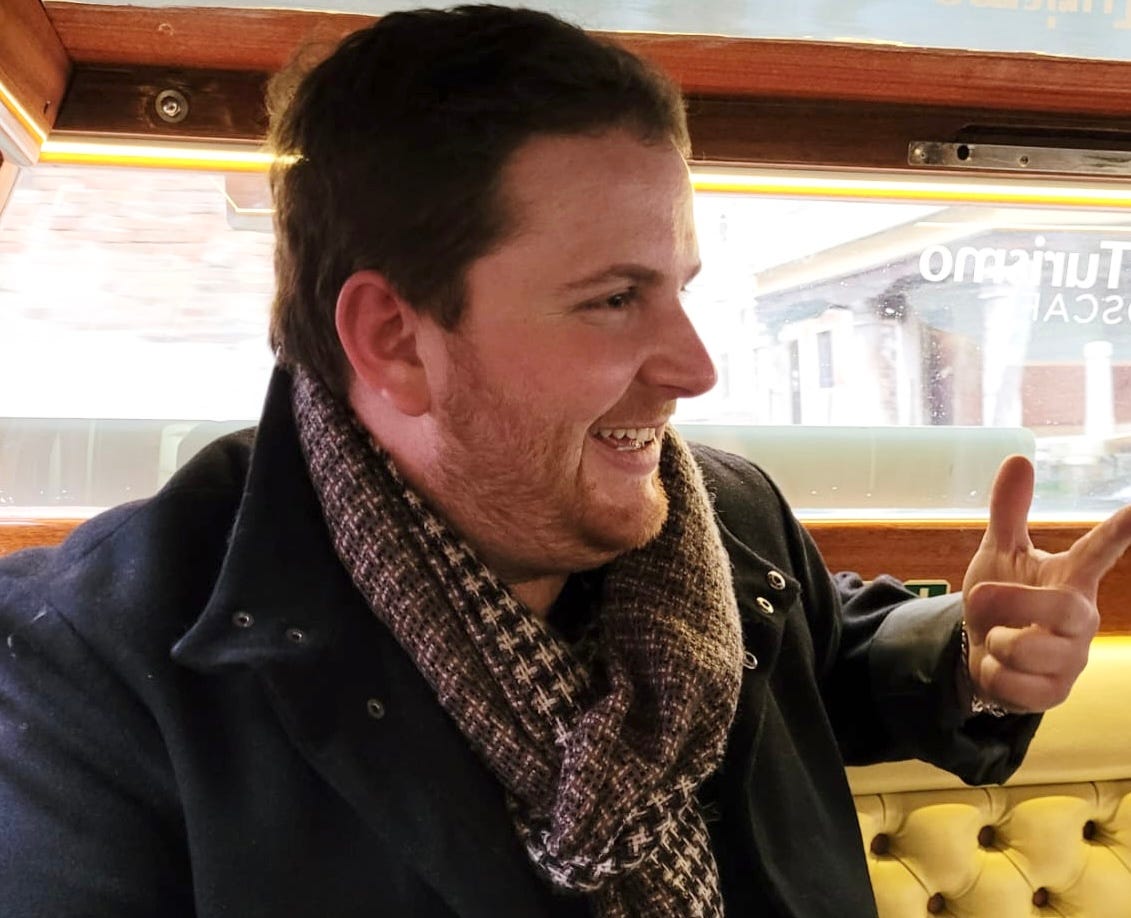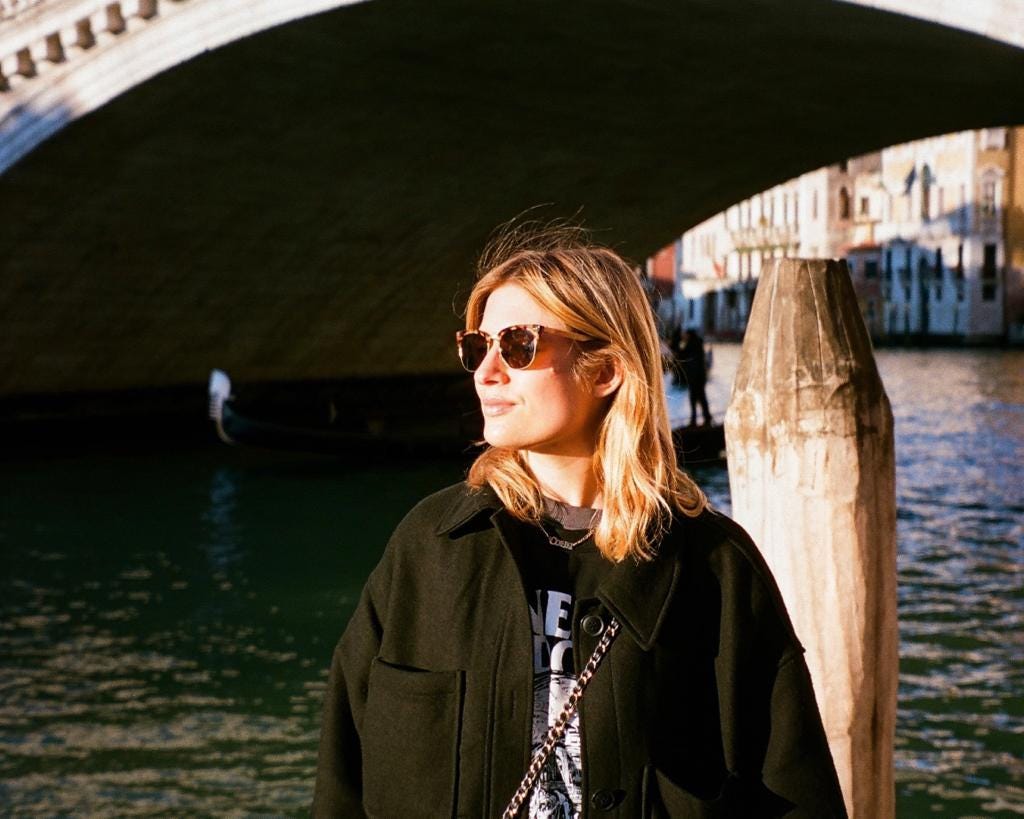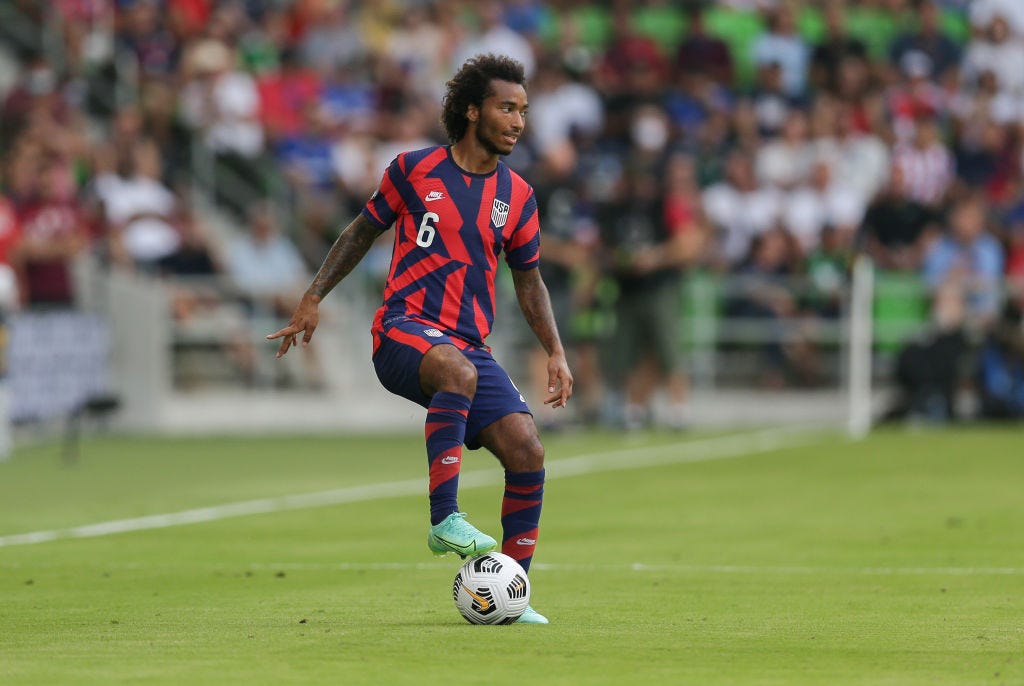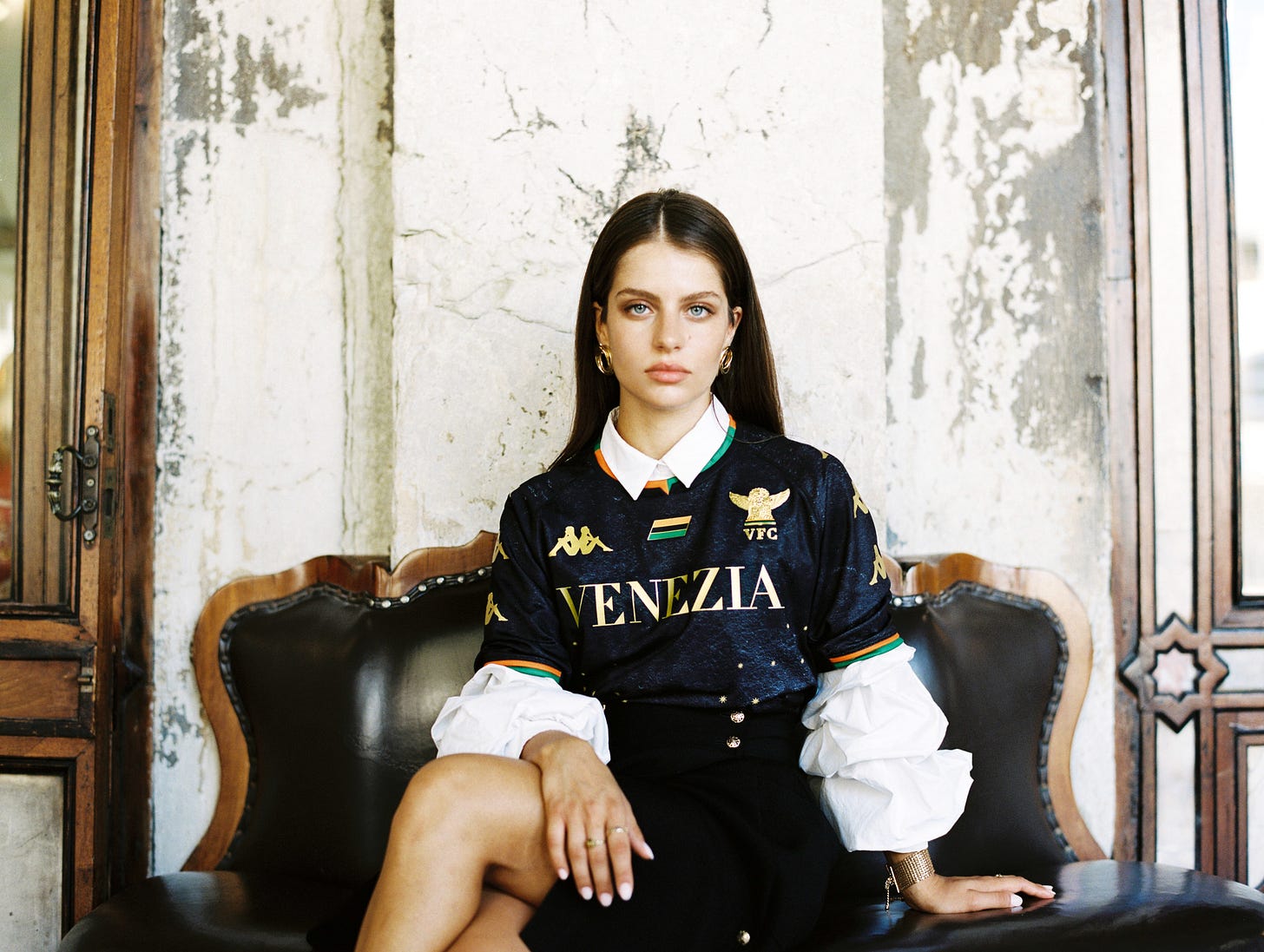Premium: Is Stability Possible in Italian Soccer?
American-owned Venezia FC has done so much right: Long-term investing, Big Data recruitment, killer branding and three promotions in six years. So why is it on the verge of relegation from Serie A?
VENICE, Italy — I’m on a boat.
With Gianluca Busio.
On our way to a Serie A game.
At a stadium surrounded—on all sides—by water.
How we got here involves a story. I had never been to Venice, and I always thought my first visit would involve a vacation with my wife, not soccer. But Venezia FC had become one of the most fascinating stories in the world’s game. Under U.S. ownership, the club in the global tourism capital had earned promotion three times in six years while rising from the fourth division to Serie A, in which it was competing this season for the first time in 20 years.
Meanwhile, Venezia had recruited a number of U.S. executives, staff and players (signing emerging youngsters Busio and Tanner Tessmann from MLS teams) and taken full advantage of the city’s fashion-mag aesthetic. Venezia’s gorgeous kits turned into a social media phenomenon and were chosen among the best in Europe this season by various hipster websites.
Philadelphia native Alexander Menta, 31, a Venezia fan who cold-emailed owner Duncan Niederauer two years ago and became the club’s director of analytics and de facto GM (more on that later), puts it this way: “I said prior to coming here that Venice is the only truly internationally known city in Europe that doesn't have a football team that represents the city equally. I can't really think of any others.”
And so, before a Sunday home game against Genoa this spring, I walk from my hotel for two miles through Venice’s trademark canals and footbridges with Mike Gartlan, Tessmann’s visiting agent. We weave our way through confetti from Carnival—revelers wearing masks and period costumes create a weird Eyes Wide Shut vibe—and throngs of tourists who apparently have little idea a Serie A match is taking place that day.
GrantWahl.com is a reader-supported soccer newsletter. Quality journalism requires resources. The best way to support me and my work is by taking out a paid subscription now. Free 7-day trials are available.
We reach the majestic Piazza San Marco and finally see groups of orange-and-green clad Venezia supporters when we settle down for lunch at a pizza place on the Via Garibaldi in the Castello neighborhood. Soon we’re joined by Menta and a surprise guest: Busio, who’s serving a yellow-card suspension and can’t play. The 19-year-old U.S national team midfielder, whose $7 million transfer last summer was a club record, is joined by his older brother, Matteo, and graciously poses for photos with fans who aren’t expecting to see him there.
There really is no pregame itinerary anywhere quite like the one in Venice. After lunch, Menta hails a top-of-the-line motorized boat that takes us the final 15 minutes to Stadio Pier Luigi Penzo, which has been expanded to 11,150 seats and refurbished with an array of flags representing the 18 nationalities of the players on the squad.
On the way, Busio plays tour guide for me. It’s a scene I never would have expected playing out on my trip, but I’ll take it. “This is where we walk every game to the stadium,” he explains as we make our way through the canal. “Our hotel is right over there, and you walk all the way down here, and there’s fans around you like this. And then you walk into the locker room.” There’s no special parking lot for the players because there simply aren’t any cars or roads.
Months after joining Venezia, the 20-year-old Tessmann still marvels at the setting, which has become a hotspot for groundhopping in-the-know European soccer tourists. “In any sport, you go to the stadium, and there’s a lot of people there, and you wait in line, and then you’re in this beautiful arena,” Tessmann tells me. “But here it’s just so different. Going to the game is also the beautiful part, being on the boat and seeing Venice and the scenery as you go. Then once you get to the stadium, it’s also a different atmosphere, where you see the sailboats right across the water and you can feel the breeze of the ocean. It’s really, truly special.”
Growing up in Alabama (Tessmann) and North Carolina (Busio), the young Americans always dreamed of making it to Europe and playing in one of the continent’s top four leagues. But they also knew what they were getting into. Venezia, picked by some observers last season to be relegated from the second division, instead surprised everyone by winning the promotion playoff and reaching Serie A. Staying up was going to be a monumental task—and unlike anything the two had experienced in MLS, which doesn’t have relegation for teams at the bottom of the league standings.
“In the MLS, you have next year in the same league, and there’s teams who go from last place to first place,” Busio tells me. “Here it’s not like that. If you finish last place, you might not be back in the league for two or three years. The pressure on you every game is totally different. We’re in a spot now where we have to win games. If you don’t, you get relegated, and your life changes. Less money. Less fans. Your value goes down. You have to play your best, or it could hurt you in the end.”

On this day, Venezia will go ahead of Genoa but end up tying 1-1, a disappointing result against a team lower in the standings. What follows in the coming weeks for Venezia will be a nightmare: 10 straight league defeats, a descent to last place and the firing of coach Paolo Zanetti.
A stirring 4-3 win over Bologna last weekend provided a respite, but the situation ahead of Saturday’s game at Roma is stark: If Venezia doesn’t win both of its final two matches, against Roma and Cagliari, it has no chance of playing in Serie A next season. That’s the brutal nature of relegation: Just because you have a great story doesn’t mean you’ll stay up.
And yet this is also true: There’s still a glimmer of hope, however faint, for survival.
Niederauer, the New Jersey-based former head of the New York Stock Exchange, took over majority control of Venezia two years ago, and since then the club has done so many things right. In an Italian soccer climate that is notoriously—some might say inherently—unstable, he has promised to prioritize stability.
Venezia has used data heavily to identify undervalued players. It has spent its limited resources on buying young talent instead of pursuing mostly loan deals. The club has invested in long-term upgrades for its stadium and training facility while improving its youth academy and adding a women’s team. Niederauer, who constantly sends text messages of support to individual players and coaches, has vowed that he will never criticize them in the media, unlike so many other Italian club owners.
But what if all those efforts to create stability don’t stave off the ultimate arbiter, the instability that’s built into the system? What if relegation comes anyway? And if it does, is it possible to create the conditions to come right back up?
In mid-February 2020, right before the start of the global COVID pandemic, Alex Menta was sitting in the Venezia stadium talking to his girlfriend at the time. He had read that Niederauer, a club investor, had just taken over majority control and ousted New Yorker Joe Tacopina, the bombastic former lawyer for the baseball star Alex Rodríguez. And so Menta decided to send Niederauer an email explaining his interest in data analytics and working for the club.
“I really didn’t believe there was a chance he was going to respond,” says Menta.
And why should Niederauer have responded? Menta was a 29-year-old fan. He had never worked for a soccer team before. He hadn’t even graduated from Temple University. He had played professional ice hockey briefly in Finland and Russia. The first soccer game he had ever attended was in 2006.

But Menta thought he could bring something to the table. He had just sold the real estate company he’d started in Boston, and he was looking for a new gig. Soccer had become an interest when he attended games at World Cup 2006, and in 2015 he dove into soccer analytics when he began watching the sport from around the world around the clock on weekends as a way to decompress from work—and betting on the games.
“I was just asking questions on Reddit,” says Menta, “and it turned into, ‘Okay, let’s add you to this group chat.’ And then, ‘Hey, let’s share this.’ People having webinars, I guess you would call it. And I would sit in and listen. It was just so fascinating. I’d heard of Moneyball. I understood the concept. And once I understood 20 percent of it, I had to know the rest of the 80 percent.”
Menta looks eerily like the actor Jonah Hill, who played the role based on the groundbreaking data analyst Paul DePodesta in the film version of Moneyball, and he was asking Niederauer for a real-life audition of his own:
Niederauer and his wife, Alison, were in their kitchen when Menta’s email came in.
“Honey, this is funny,” he says he told her. “I just got a cold email from some kid named Alexander Menta, who I guess is from Philly and lives in Boston. And he’s a fan of Venezia and has done some analytics. It sounds pretty interesting.”
She laughed. “He has no idea he’s about to get an email back from you, does he?”
The written response from Niederauer came immediately, and he and Menta were on the phone together a week later. “I like giving young people a chance, especially when he approached me the way he did,” Niederauer says. “So phase one of this was he took me for a test drive, and I took him for a test drive.”
What Menta calls his “unpaid internship” started with him doing an analysis of Venezia’s current players, who were in the Serie B relegation zone when the league stopped due to COVID. The owner then asked him to put together a “wish list” of young players with buy-and-resell potential, which ended up including Busio and former Bayern Munich midfielder Michaël Cuisance, who are both on this season’s team.
Soon Menta was being added to conference calls with Venezia’s technical director and head coach. “For me as a fan, it was probably the coolest thing I’ve ever done,” Menta recalls. “I don’t get nervous for pretty much anything, but my heart was pounding. I couldn’t believe I was about to give advice to the people who I’m a fan of.”
Paolo Poggi, the club’s affable Venice-born technical director and a former player, explains: “It took time to understand each other because we were only focused on videos and live matches. Those weeks when we were building the team for Serie B, we had to be very quick, but I think that if you are open-minded and you think that what you don’t know can help you to improve your knowledge, everything is mostly easier. It helps a lot on the choice of the players because Alex is taking care of something that the video can’t tell you. At the same time, Alex understood that the live match or the videos or the experience we had as football players can help his data to be more realistic.”
Menta arrived in Venice in late June 2020 for the post-COVID restart, with the team in danger of being relegated to the third tier. Still unpaid, he crunched data as Venezia managed to stay up in Serie B. Then he got to work.
“When he really started to build my trust was when I got to watch how he operated,” Niederauer says. “As soon as we knew we were safe in Serie B, he was at work the next morning, already thinking about the roster for the coming season and knowing we were going to have to make significant changes. We probably turned over half the roster, and we were able to do that because Alex started working on it immediately instead of what a lot of Italian clubs do and wait until the last week of the window.”
Now Menta was being paid, and he became the club’s de facto GM. “We had no non-Italian presence,” he says, “so basically our goal from the start was, we want to make the team more international. We want to own the players, and we want to make our average age much younger.”

Menta’s first free-transfer signing ahead of the Serie B season using his data analysis was a 6'5", 21-year-old Austrian central midfielder named Michael Svoboda. “We were going through his data, and you could see that his ball progression, his ball-handling and his passing skills were incredible,” Menta says. “But most importantly, his aerial duels and duel percentages were a different level for somebody who’s standing in the middle of the field, basically a pillar, while little Austrians are running around him. He had played the most U-21 minutes in the Austrian Bundesliga the year before but wasn’t getting much attention. So I called his agent, and he was the first signing.” (Svoboda has done well and continues starting for Venezia in Serie A.)
Another signing was a 24-year-old Slovenian free-agent midfielder named Domen Črnigoj, who’d been playing in Switzerland for Lugano. “Everybody said he’s always hurt,” Menta says. “They didn’t think he was even ready for Serie B, which he proved obviously wrong last year. And now he’s starting in Serie A and scoring goals and assisting.”
Menta’s Serie B roster build for 2020-21 went from there, and Venezia demolished expectations on the field. “They really had a magical run last year,” Niederauer says. “I thought it was a success even if we didn’t get promoted at the end. We were picked to finish near the bottom. We were going to take a longer view on everything. It wasn’t going to be about immediate returns or this week’s match or what happened yesterday or tomorrow. I said we’re going to put a lot of stakes in the ground to build the foundation for longer-term success, whether we’re in Serie A or Serie B. And that was hard for people to wrap their heads around at first. It was almost an anomaly within Italian football.”
Venezia finished fifth in Serie B and then stunned Italy by winning the six-team, five-game promotion playoff to qualify for Serie A. During the city-wide celebrations, Niederauer jumped into a canal with his clothes on.
Menta joined in the festivities, and he started receiving interest in his services from bigger clubs in Europe (which he has turned down to this point). By the time he started doing another huge roster rebuild before this season, he was regularly taking calls with some of the continent’s most powerful soccer executives, people like Chelsea director Marina Granovskaia and the sporting-side heads at Bayern Munich. Not bad for a guy who was a Venezia fan sitting in the stands a year and a half earlier.
But something else was on Menta’s mind, too. “My purpose changed in all this,” he says. “My mom passed away.” His mother, Stephanie, whose family had been from nearby Treviso, had encouraged him to stay in Venice when he doubted himself at first: You’re exactly where you’re supposed to be. “She was following the games and the team,” he says. “It must have been midnight at one point, and I snuck on the field at the stadium and put some of her ashes on the field. It became a really personal thing.”
In the spring of 2016, Ted Philipakos got a call. He was transitioning out of a career as a soccer agent and had started teaching courses at New York University, with the plan of settling down in the Big Apple. But A-Rod’s former lawyer, Joe Tacopina, had bought Venezia FC the previous year, and he pitched Philipakos on picking up and moving to Italy to work as the chief marketing officer for a club then in the fourth division.
“I was tasked with building a global brand out of essentially nothing, which was an absolutely crazy idea,” Philipakos says. “The club had just come out of its third bankruptcy in a 10-year period. It had no presence on social media. There was no reach of the brand outside of Venice. Even in Venice, people had pretty much stopped paying attention. The big idea was we're going to leverage the prominence of Venice in order to build a global football brand. That's a pretty simplistic idea, and the path to ultimately get there takes lots of time and nuance and luck. But that was the job.”

Philipakos theorized that a number of shifts were happening in global soccer that were generational, technological and even psychographic. Young people in both established and emerging soccer markets had unprecedented access to games on television and the internet that didn’t just include the elite clubs. What’s more, they didn’t support just one team, and they were open to paying attention to smaller clubs, especially if they had a compelling story—and that story didn’t have to come entirely from the playing field.
“As I saw the landscape changing, I thought if we were ever going to have a fighting chance, this is the wave that you have to ride,” Philipakos says. “We were going to need to tell a unique story that would resonate with people. And we couldn’t guarantee wins, obviously.”
Just as he was making progress, though, the volatility of Italian soccer came into play—through two sets of Italian American owners. After one year at Venezia, Philipakos quit due to the culture created by Tacopina. “I no longer had faith in the leadership, and I felt a toxic workplace had emerged, and I didn’t want any part of it anymore.”
Philipakos and media director Sonya Kondratenko, an American he had convinced to join the Venezia project, left the club and moved to Reggiana, which had been bought by baseball Hall of Famer Mike Piazza. In a story famously told by Robert Andrew Powell in The Athletic, Piazza’s wife, Alicia, became the club’s vice-president, behaved erratically and helped run Reggiana into the ground. “It might have been even more toxic [than Tacopina’s Venezia], probably,” says Philipakos. When the Piazzas skipped town, leaving behind angry Reggiana fans, Philipakos moved to Greece and thought he was done working for soccer clubs.
But when Niederauer took over for Tacopina in early 2020 and became the new Venezia owner, the possibility of a return by Philipakos and Kondratenko opened up. “He sold me pretty quickly,” Philipakos says. “I understood this is a serious guy. There’s a chance to pick up where we left off and finally do this the right way.”

Much as Paolo Sorrentino’s film La Grande Bellezza uses classic visuals of Rome to establish an identity, they prescribed a Venice aesthetic for the club on multiple channels, including social media and analog platforms. “We've had a rule since the beginning of this second tour: We don’t do interviews in the office ever,” says Kondratenko, a Baltimore native. “We live in Venice, something that we and Duncan are super passionate about. We’re ambassadors for the city. Part of that is every interview we do is either in the streets or the lobby of a partner hotel or a restaurant that we really like. And at the same time, we benefit from having a classic Venetian location, maybe in a palazzo that’s 600 years old.”
The club recently published a limited-edition book of photographs taken during the 2020-21 season by Ethan White, a former MLS player turned photographer, and has had a different shooter with the team this season. At the same time, Philipakos oversaw a switch of kit supplier from Nike to the smaller, Italian-based Kappa that led to some of the most coveted kits in global soccer this season.
“I brought back a designer that I had been working with in 2017 before all of us left, to kind of resume the DNA of that thinking,” he says. “The switch to Kappa was important. Not only did they have the ability to execute the ideas that we had, but they were willing to give us that creative control which we didn’t have with Nike.”
The result has been an unequivocal commercial success. Supply hasn’t kept up with demand. And according to Philipakos (who sidelights as the Venezia stadium deejay on gamedays), 93 percent of Venezia’s online shop sales are coming from outside of Italy. “If you think back to 2016 and this idea of creating a global brand out of nothing,” he says, “that really shows the scope is global now.”
As ever, though, the commercial side can’t guarantee wins on the field.
Tanner Tessmann co-hosts a podcast called ChumChat, and a couple years ago he had Gianluca Busio on as an interview guest. When Tessmann brought up transfer rumors, he named Venezia, and they both laughed it off, not thinking there was any chance that both of them would be playing for the club two years later.
“Looking back at it, it’s pretty cool,” Busio tells me. “Now we live in the same apartment complex, where we’re hanging out every day. We sit beside each other in our lockers, and it’s what you’d expect of the two Americans on the team. We’re definitely tight now.”
At one point in high school, Tessmann signed with Clemson to play not just soccer but American football (as a placekicker) for one of the country’s best known coaches, Dabo Swinney. There’s a special connection. “Dabo is my godfather,” Tessmann explains. “I call him Uncle Bo. We’re related in a long family tree, but he’s been my dad’s best friend since high school. I’ve spent many summers in Clemson, many trips to games, going to Boca Raton in Florida together on vacation. I was committed to go to Clemson, but things changed.” FC Dallas decided to offer Tessmann a pro contract, and it was all soccer from there.

“Tanner is what I considered my big bet,” Menta says. “He’s a kid who’s an athletic specimen. He’s huge, he’s fast, he’s strong, and above all nobody's going to outwork Tanner. The data on him was interesting. Was it like a normal purchase where it was green lights all over the board? No, and I told him the same thing. But if you bring his size and speed and improve a couple areas of his game, I’m excited to see what he does. And Gianluca, I think he’ll be playing major international football soon. He’s so smooth and calm, it’s actually incredible. They give us something now on the field, but they also give us an incredible chance in the future for us and them to sell them at a high number.”
All the losing has been hard this season on the young Americans. But Busio has logged 1,951 minutes in Serie A and remains a candidate to make the U.S. World Cup team, while Tessmann has managed 662 minutes in 19 league games.
For Busio, whose Italian father, Alessandro, had him watching calcio from a young age, getting to play in the San Siro this season was just one of several special moments. “When I was looking at the teams that were interested and the teams I could choose from, I narrowed it down to teams where I thought I’d have the opportunity to play. And if it’s a team that's fighting in a relegation battle, I was OK with that for me. I just thought for my development at this age, what I need is playing. I trusted my ability to prove myself when I’m out there, but also I have to be on the field to do that.”
At the start of preseason, Duncan Niederauer addressed Venezia’s players and staff about the 38-game Serie A campaign in front of them. “We’re all going to learn together,” he told them. “I know some of you probably feel like you’re in over your head right now. If it makes you feel any better, and it may not, so am I. We’re here before we expected to be. So don’t be shy about asking for help. And if we don’t do that, we’re more likely to make bigger mistakes. No one has to pretend a bunch of things you don’t know. I don’t know what I’m doing yet.”
When I visited Venezia in late February, the club was one spot above the relegation zone. But the tension about the drop was palpable even then. “We’re way too early to Serie A,” Menta told me. “We wanted to grow it much more organically and give ourselves time, because it’s hard when you get there too fast. I just didn’t want to have to build a team twice in a row. You lose the soul of the team. You lose the heart of the team. But here we are. And honestly, it’s been an amazing thing for the city. The fans deserve it. It’s been 20 years.”
What has gone wrong this season? In addition to the massive roster turnover, Venezia still ranks last or next-to-last in spending on players in Serie A, according to Niederauer. Nor has the team played well against its fellow bottom-dwellers in the league. It has conceded more goals than all but two other teams, and the club departed from its usual signing strategy at times.
“We did things that we normally wouldn't do,” Menta says. “I've never been one to advocate for signing 30-plus-year-old people. It doesn’t fit my M.O. So the Nani deal was interesting.” In January, the club signed the 35-year-old former Portuguese international on a free transfer, and the results haven’t been worth the expenditure.
What happens to Venezia’s players if the club plays in Serie B next season? Well, the contracts they signed include one salary for Serie A and one for Serie B. Sometimes those are the same, but at times they’re not. Some contracts have contingency releases, and some of the team’s top players may be sold to first division clubs elsewhere.
When Venezia fired Zanetti in late April and replaced him with youth coach Andrea Soncin on an interim basis, Niederauer said: “We all share credit for the successes of last season, and we must all take accountability for the failures of this season. It is also clear that we must challenge ourselves to fight with everything we have until the season is over and do whatever we think it takes to create an environment where delivering a miracle is possible.”
The quest for Venezia’s miracle continues on Saturday in Rome.








1000 percent agree. This is one of the best stories I’ve read all year. Captivating to hear the experiences from different levels of the club. Really rooting for them all to be successful.
Wonderful article. A good reminder why people should subscribe.